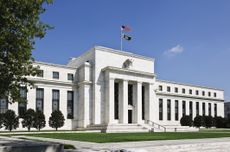
These investments are close enough to government bonds in terms of safety, but make sure you're aware of the risks.
When you purchase through links on our site, we may earn an affiliate commission. Here’s how it works.

Bonds help add diversity to your portfolio and control risk. But they can be complicated. We can help you understand the basics about agency bonds and make them work for you.
A number of U.S. government agencies and government sponsored enterprises (GSE) issue debt securities. The key difference between a GSE and a federal agency is that a GSE’s obligations are not guaranteed by the government, whereas a federal agency’s debt is backed up by a government guarantee. Bonds issued by a GSE are backed only by that GSE's ability to pay.
Agency bonds are typically issued through broker-dealers. The bonds are offered in maturity terms ranging from less than a year to 30-year. Some agency bonds may be callable and subject to call risk. Agency bonds are less liquid than treasury bonds and usually pay a slightly higher interest rate as compensation. Minimum-purchase requirements vary greatly, ranging from $1,000 to $25,000.
Be a smarter, better informed investor.
Save up to 74%
Profit and prosper with the best of expert advice on investing, taxes, retirement, personal finance and more - straight to your e-mail.
Profit and prosper with the best of expert advice - straight to your e-mail.
Interest earned on GSE debt is taxable, while interest on federal agency debt is tax-exempt. It is an important detail as taxability may impact price and return.
Government agencies include:
These bonds are backed by the full faith and credit of the U.S. government to pay interest and pay back principal at maturity. Although the Tennessee Valley Authority is a government agency, (TVA) bonds are not backed by a government full faith and credit guarantee but rather by the power revenue generated by the Authority.
GSEs are not backed by the full faith and credit of the U.S. government. These bonds are subject to both credit risk and default risk and the yield on these bonds is typically slightly higher than on U.S. Treasury bonds.
Note: Freddie Mac and Fannie Mae were both placed into conservatorship by the Federal Housing Finance Agency (FHFA), on September 6, 2008. This essentially confirmed the market's longstanding assumption that the GSEs' debt securities would be backed by the U.S. Government in case of crisis.
Among the most popular of agency securities are those backed by the Government National Mortgage Association, or Ginnie Mae, which helps create a secondary market for home mortgages.
Ginnie Mae securities are called pass-through certificates and come in minimum denominations of $25,000. But for as little as $1,000, you can buy into a Ginnie Mae mutual fund or unit trust.
Freddie Mac participation certificates (issued by the Federal Home Loan Mortgage Corp.) and Fannie Mae securities (issued by the Federal National Mortgage Association) come in denominations starting at $1,000.
Mortgage-backed securities can be a solid addition to an investment portfolio, but many investors don't understand the risks. As with bonds, their market value declines as interest rates rise. But Ginnies, Fannies, and Freddies carry another risk: as mortgage rates go down and homeowners refinance, their mortgages get paid off and drop out of the pool.
Investors get the principal back, but the lucrative return goes up in smoke. This has the perverse effect of driving the price of Ginnie Maes and similar issues down at the very time that the price of bonds is going up.
Meanwhile, because you're at the mercy of thousands of homeowners making independent decisions about when to refinance, the principal comes back to you in unpredictable chunks. Your cash flow is erratic and so is your yield. To compensate for this uncertainty, mortgage pools have generally had to pay a percentage point or two more than Treasury bonds, which are much more predictable.
U.S. agency bonds are a highly rated bond investment that give you the opportunity to gain a higher return than Treasury bonds, while sacrificing very little in terms of risk or liquidity. GSE's also offer a higher return, but with slightly more risk than an agency bond.
Agency bonds and GSEs are considered to have a high credit quality due to the implicit or explicit guarantee provided by the issuing agency or the U.S. government. Those that are not directly backed by the full faith and credit of the U.S. government, are still perceived as having lower credit risk than corporate bonds.
Profit and prosper with the best of Kiplinger's advice on investing, taxes, retirement, personal finance and much more. Delivered daily. Enter your email in the box and click Sign Me Up.
By submitting your information you agree to the Terms & Conditions and Privacy Policy and are aged 16 or over.
Personal Finance WriterDonna joined Kiplinger as a personal finance writer in 2023. She spent more than a decade as the contributing editor of J.K.Lasser's Your Income Tax Guide and edited state specific legal treatises at ALM Media. She has shared her expertise as a guest on Bloomberg, CNN, Fox, NPR, CNBC and many other media outlets around the nation.

5 Stocks to Buy for a Trump Presidency The race for the White House is heating up and these five stocks are set to benefit if Donald Trump claims victory. By Will Ashworth Published 7 September 24

6 Target-Date Funds to Buy For Your Retirement These six target-date funds are good set-it-and-forget-it options that are a staple of retirement plans. By Nellie S. Huang Published 7 September 24

Kiplinger Special: How Businesses Should Budget for 2025 Kiplinger Forecasts From fuel to AI software subscriptions, here's what you can expect to pay next year. By John Miley Published 19 August 24

Intel Braces for an Even Tougher Road Ahead The Kiplinger Letter Amid a long, costly turnaround, Intel resets expectations again. Its new woes raise questions about U.S. industrial policy and global chip competition. By John Miley Published 12 August 24

Kiplinger Special: The Long-Term Future of the U.S. Economy The Kiplinger Letter Kiplinger's report into what it will take the U.S. to maintain a healthy economic growth rate. By David Payne Published 23 June 24

Fed Rate Cuts Still on Hold The Kiplinger Letter With inflation stubbornly elevated, the Federal Reserve will keep interest rates high for now. By David Payne Published 7 May 24

A Spotlight on the Pacific States: The Kiplinger Letter The Kiplinger Letter Most Pacific states are seeing good job growth in multiple sectors including tourism, hospitality, and construction. By David Payne Published 13 March 24

The Robots Are Coming. But Not For a While The Kiplinger Letter There’s excitement in the tech sector over the potential of humanoid robots, but widespread adoption is likely to be years away. By John Miley Published 10 March 24

Farmers Face Another Tough Year As Costs Continue to Climb: The Kiplinger Letter The Kiplinger Letter Farm income is expected to decline for a second year, while costs continue to up-end farm profitability. By Matthew Housiaux Published 10 March 24

A Spotlight on the Mountain States: The Kiplinger Letter The Kiplinger Letter Most Mountain states are seeing good job growth in multiple sectors from healthcare, energy, and semiconductor production to farming and government. By David Payne Last updated 6 March 24
Kiplinger is part of Future plc, an international media group and leading digital publisher. Visit our corporate site.
© Future US, Inc. Full 7th Floor, 130 West 42nd Street, New York, NY 10036.